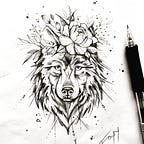Maybe we don’t need mindfulness, maybe we need hobbies
In a time where our lives are filled with digital media, it is no surprise that we need to be taught these skills through wearable tech and mindfulness applications. But maybe what we really need to do is put down our phones and pick up a hobby.
I was never one of those children that needed to be convinced to study math, but I clearly remember the big people arguing about how important math was because it teaches logic and problem solving. Scientific subjects where answers can clearly be classified as right or wrong are put on a pedestal for measuring intelligence, mostly because they can be measured. But in our pursuit to measure ourselves and classify ourselves on this superficial scale, we sometimes miss the opportunity to examine the intrinsic life skills that we gain from other areas of study.
Visual arts teach us mindfulness.
Art forces us to stop and really, really look at something. Drawing an animal or person requires you to examine every minor detail of their body; how the light and shadows play on their muscle tone; the playfulness in their eyes and the small imperfections that make them beautifully unique. This habit carries over into life. The details and intricacies of a medieval building can take weeks to patiently master. Practicing art regularly teaches us to notice the beauty and texture of the world.
Sports teach us perseverance and resilience.
Coming face-to-face with mental and physical boundaries is the crux of any sport. Whether it’s running a marathon or simply waking up to go to gym, we become masters of manipulation as we go up against our biggest adversaries — ourselves. We learn how to trick ourselves into evolving. We sleep in our running clothes and sign up for gym classes with friends or personal trainers. We learn that with time and consistency, we are capable of anything.
Writing develops memory and observation.
I have a friend who is a master of extracting stories from people. She can spot an interesting character a mile away and have even the most discreet sharing their secrets within no time. These secrets often get scraped together to create a new character causing trouble on a page somewhere deep in one of her fictitious worlds. Her characters are never made up; they are carefully collected from her daily life. Storytelling is an art form that requires carefully planting subject matter, to reignite it later as a plot twist or character development. Nothing is inconsequential. Taking these observations and sorting them into a memory-world is a carefully mastered skill used not only by writers, but by students and in professional memory sports.
And, perhaps most interestingly, underlying all these subjects — we can observe math — if we choose to do so.
